-
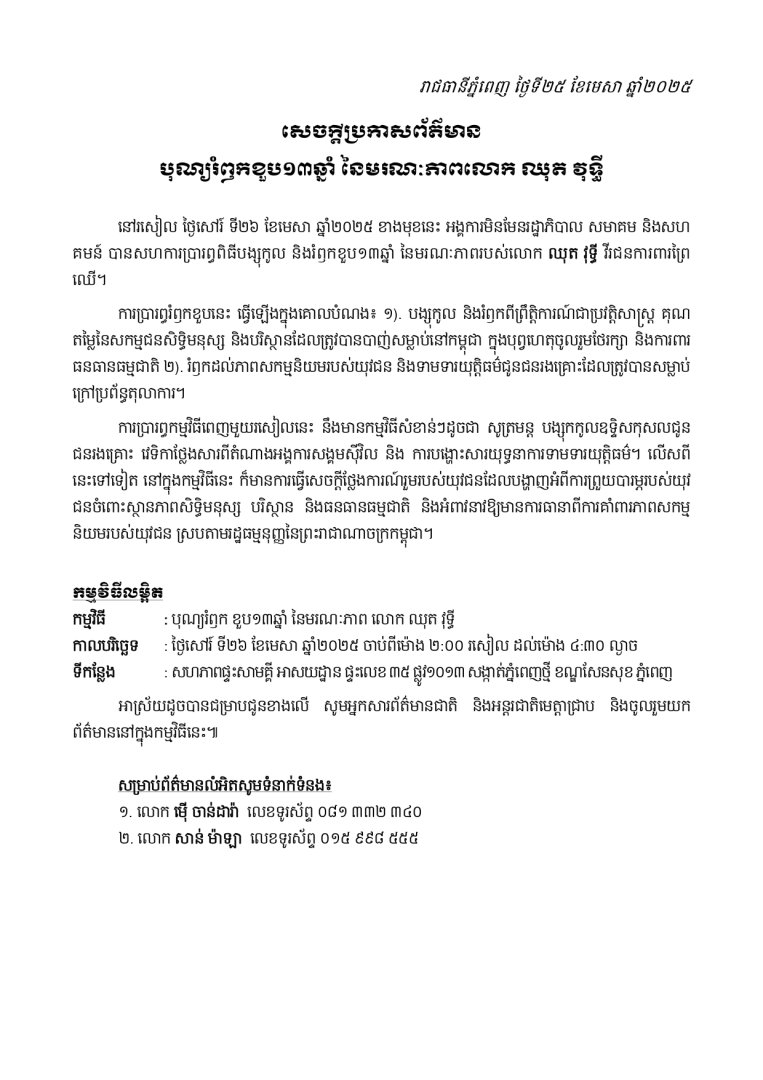
អានបន្ត បុណ្យរំឭកខួប១៣ឆ្នាំ នៃមរណៈភាពលោក ឈុត វុទ្ធី
នៅរសៀល ថ្ងៃសៅរ៍ ទី២៦ ខែមេសា ឆ្នាំ២០២៥ ខាងមុខនេះ អង្គការមិនមែនរដ្ឋាភិបាល សមាគម និងសហគមន៍ បានសហការប្រារព្ធពិធីបង្សុកូល និងរំឭកខួប១៣ឆ្នាំ នៃមរណៈភាពរបស់លោក ឈុត វុទ្ធី វីរជនការពារព្រៃឈើ។
អានបន្ត -
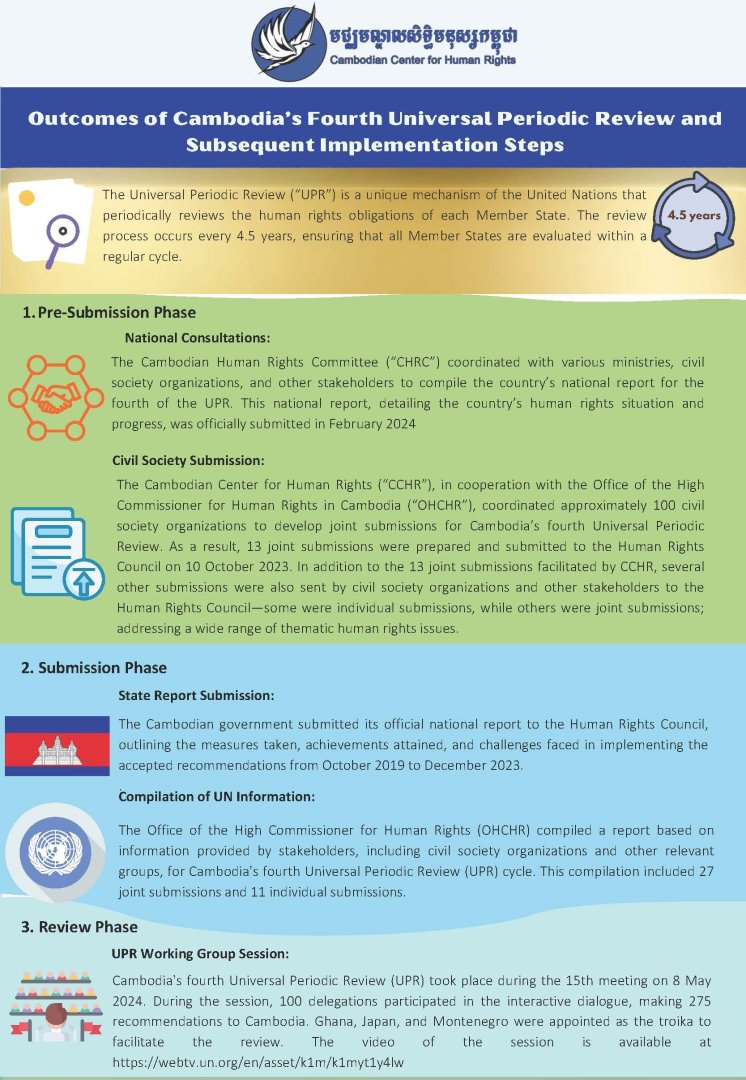
អានបន្ត លទ្ធផលនៃដំណើរការពិនិត្យជាសកលតាមកាលកំណត់ជុំទី ៤ របស់ប្រទេសកម្ពុជា និងដំណាក់កាលអនុវត្តបន្ទាប់
នៅថ្ងៃទី១០ ខែតុលា ឆ្នាំ២០២៤ នេះ មជ្ឈមណ្ឌលសិទ្ធិមនុស្សកម្ពុជា («ម.ស.ម.ក») ចេញផ្សាយខិត្តប័ណ្ណព័ត៌មានស្តីពី «លទ្ធផលនៃដំណើរការពិនិត្យជាសកលតាមកាលកំណត់ជុំទី៤ របស់ប្រទេសកម្ពុជា និងដំណាក់កាលអនុវត្តបន្ទាប់»។ ក្នុងអំឡុងពេលដំណើរការយូភីអជុំទី៤របស់ប្រទេសកម្ពុជានៅថ្ងៃទី០៨ ខែឧសភា ឆ្នាំ២០២៤ ប្រទេសជាសមាជិកនៃអង្គការសហប្រជាជាតិចំនួន១០០ បានផ្តល់អនុសាសន៍ចំនួន ២៧៥ ដល់ប្រទេសកម្ពុជា។ ក្នុងចំណោមអនុសាសន៍ទាំងនេះ ប្រទេសកម្ពុជាបានទទួលយកអនុសាសន៍ចំនួន ២៣២ និងកត់សម្គាល់ចំនួន៤៣។
អានបន្ត -
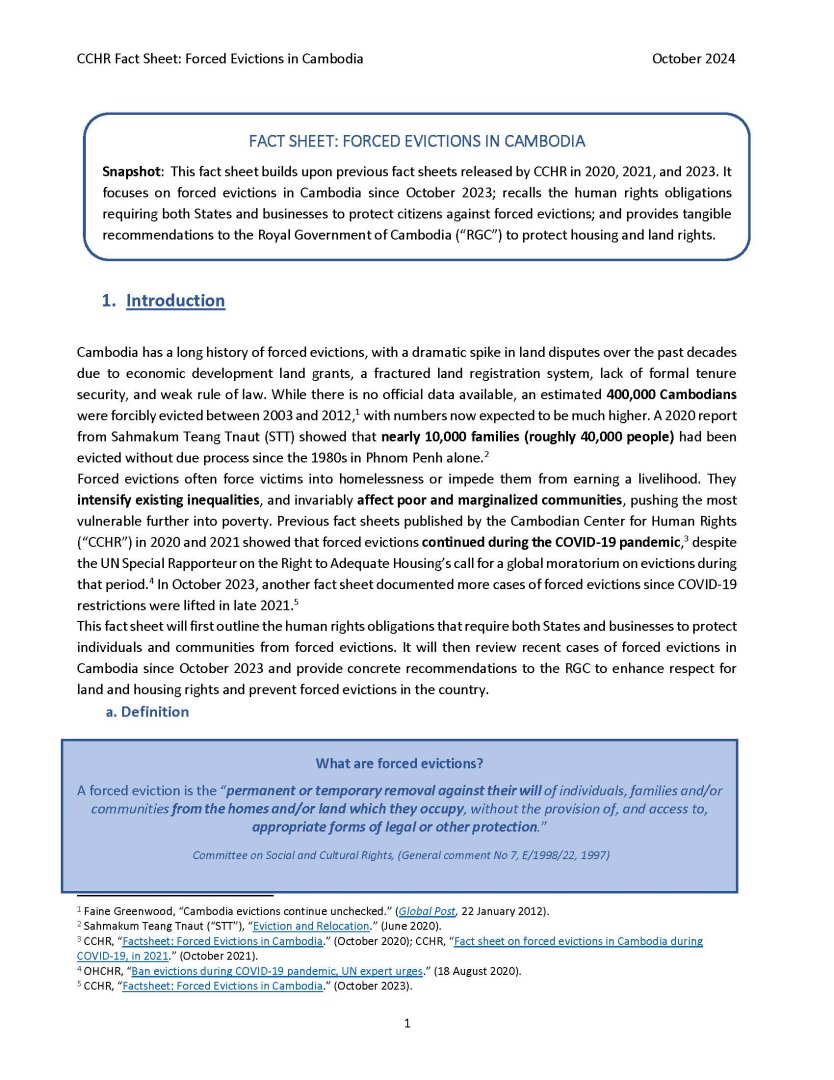
អានបន្ត ការបណ្ដេញចេញដោយបង្ខំនៅប្រទេសកម្ពុជា
ផ្សារភ្ជាប់នឹងការប្រារព្វទិវាសិទិ្ធលំនៅឋានពិភពលោក ឆ្នាំ២០២៤ នេះ មជ្ឈមណ្ឌលសិទ្ធិមនុស្សកម្ពុជា (“ម.ស.ម.ក”) ចេញផ្សាយសលាកបត្រព័ត៌មានស្តីពីការបណ្តេញចេញដោយបង្ខំនៅកម្ពុជា ចាប់តាំងពីការរឹតបន្តឹងក្នុងអំឡុងពេលជំងឺកូវីដ-១៩ ត្រូវបានដកចេញកាលចុងឆ្នាំ ២០២១ រហូតមកដល់បច្ចុប្បន្ន។ សលាកបត្រព័ត៌មាននេះត្រូវបានចងក្រងឡើង ដើម្បីបំពេញបន្ថែមទៅលើសលាកប័ត្រព័ត៌មានមុនៗ ដែល ម.ស.ម.ក បាននចេញផ្សាយក្នុងឆ្នាំ២០២០ ២០២១ ២០២២ ២០២៣ និងដើមឆ្នាំ២០២៤។ សលាកបត្រព័ត៌មាននេះ រំលឹកឡើងវិញអំពីកាតព្វកិច្ចសិទ្ធិមនុស្សដែលទាមទារឱ្យរដ្ឋ និងធុរកិច្ច ត្រូវការពារប្រជាពលរដ្ឋពីការរំលោភសិទ្ធិមនុស្សរួមទាំងការ បណ្តេញចេញដោយបង្ខំ។ ផ្នែកបញ្ចាប់នៃសលាកបត្រព័ត៌មាននេះ ផ្តល់ជាអនុសាសន៍ជាក់លាក់ដល់រាជរដ្ឋាភិបាលកម្ពុជាបញ្ឈប់ការបណ្តេញដោយបង្ខំ ការពារលំនៅឋានរបស់ប្រជាពលរដ្ឋ និងលើកកម្ពស់ការគោរពសិទ្ធិដីធ្លី និងសេរីភាពជាមូលដ្ឋាន៕
អានបន្ត -
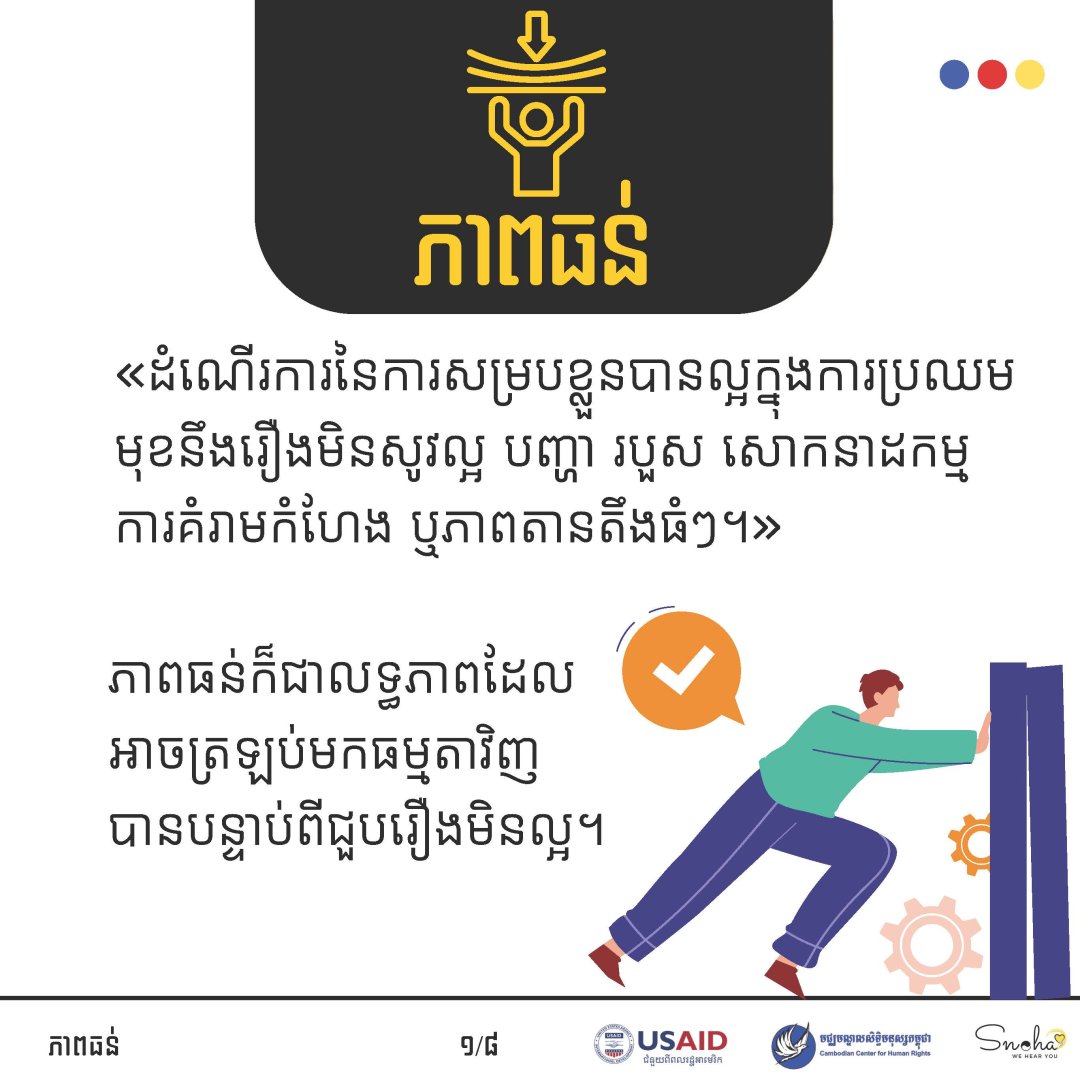
អានបន្ត -
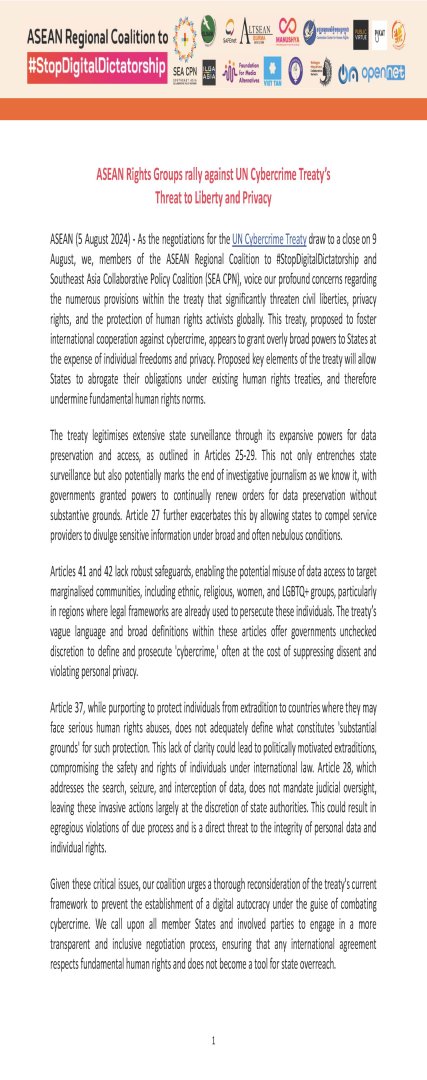
អានបន្ត ASEAN Rights Groups rally against UN Cybercrime Treaty’s Threat to Liberty and Privacy
ASEAN (5 August 2024) - As the negotiations for the UN Cybercrime Treaty draw to a close on 9 August, we, members of the ASEAN Regional Coalition to #StopDigitalDictatorship and Southeast Asia Collaborative Policy Coalition (SEA CPN), voice our profound concerns regarding the numerous provisions within the treaty that significantly threaten civil liberties, privacy rights, and the protection of human rights activists globally. This treaty, proposed to foster international cooperation against cybercrime, appears to grant overly broad powers to States at the expense of individual freedoms and privacy. Proposed key elements of the treaty will allow States to abrogate their obligations under existing human rights treaties, and therefore undermine fundamental human rights norms.
អានបន្ត -
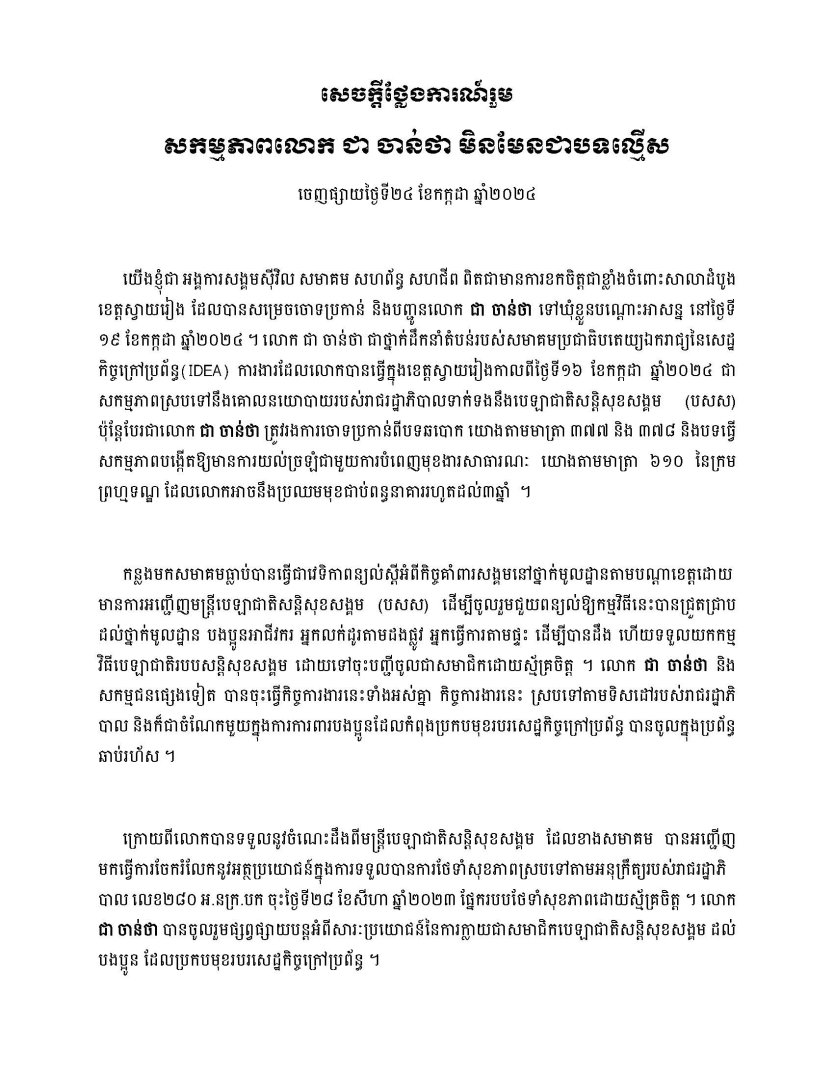
អានបន្ត សេចក្ដីថ្លែងការណ៍រួម សកម្មភាពលោក ជា ចាន់ថា មិនមែនជាបទល្មើស
យើងខ្ញុំជា អង្គការសង្គមស៊ីវិល សមាគម សហព័ន្ធ សហជីព ពិតជាមានការខកចិត្តជាខ្លាំងចំពោះសាលាដំបូងខេត្តស្វាយរៀង ដែលបានសម្រេចចោទប្រកាន់ និងបញ្ជូនលោក ជា ចាន់ថា ទៅឃុំខ្លួនបណ្តោះអាសន្ន នៅថ្ងៃទី១៩ ខែកក្កដា ឆ្នាំ២០២៤ ។ លោក ជា ចាន់ថា ជាថ្នាក់ដឹកនាំតំបន់របស់សមាគមប្រជាធិបតេយ្យឯករាជ្យនៃសេដ្ឋកិច្ចក្រៅប្រព័ន្ធ(IDEA) ការងារដែលលោកបានធ្វើក្នុងខេត្តស្វាយរៀងកាលពីថ្ងៃទី១៦ ខែកក្កដា ឆ្នាំ២០២៤ ជាសកម្មភាពស្របទៅនឹងគោលនយោបាយរបស់រាជរដ្ឋាភិបាលទាក់ទងនឹងបេឡាជាតិសន្តិសុខសង្គម (បសស) ប៉ុន្តែបែរជាលោក ជា ចាន់ថា ត្រូវរងការចោទប្រកាន់ពីបទឆបោក យោងតាមមាត្រា ៣៧៧ និង ៣៧៨ និងបទធ្វើសកម្មភាពបង្កើតឱ្យមានការយល់ច្រឡំជាមួយការបំពេញមុខងារសាធារណៈ យោងតាមមាត្រា ៦១០ នៃក្រមព្រហ្មទណ្ឌ ដែលលោកអាចនឹងប្រឈមមុខជាប់ពន្ធនាគាររហូតដល់៣ឆ្នាំ ។
អានបន្ត -
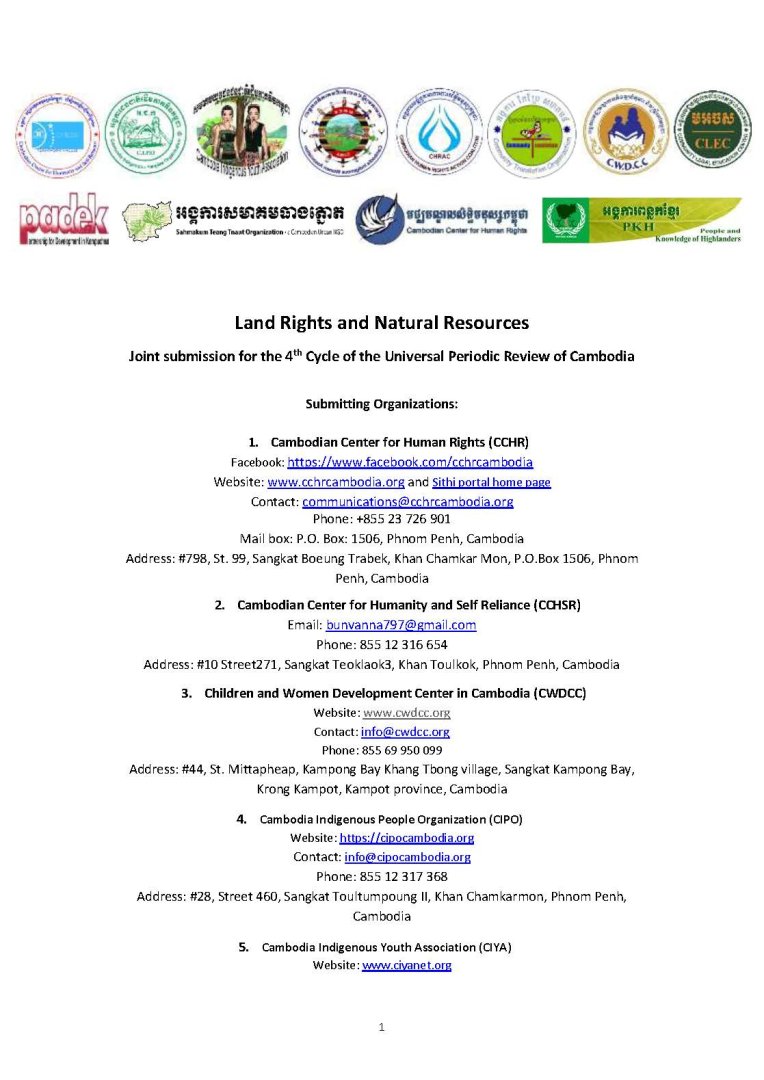
អានបន្ត Joint Submission_4th UPR_Land & Natural Resources
This report is a joint submission by the Cambodian Center for Human Rights (CCHR), the Cambodian Center for Humanity and Self Reliance (CCHSR), the Children and Women Development Center in Cambodia (CWDCC), the Cambodia Indigenous People Organization (CIPO), the Cambodia Indigenous Youth Association (CIYA), Cambodian Indigenous Women Association (CIWA), the Cambodian Human Rights Action Coalition (CHRAC), Community Legal Education Center (CLEC), the Community Translation Organization (CTO), the Partnership for Development in Kampuchea (PADEK), Ponlok Khmer, and Sahmakum Teang Tnaut (STT) for the fourth Universal Period Review (UPR) of Cambodia. It analyses major developments related to land rights and natural resources governance since January 2019.
អានបន្ត -
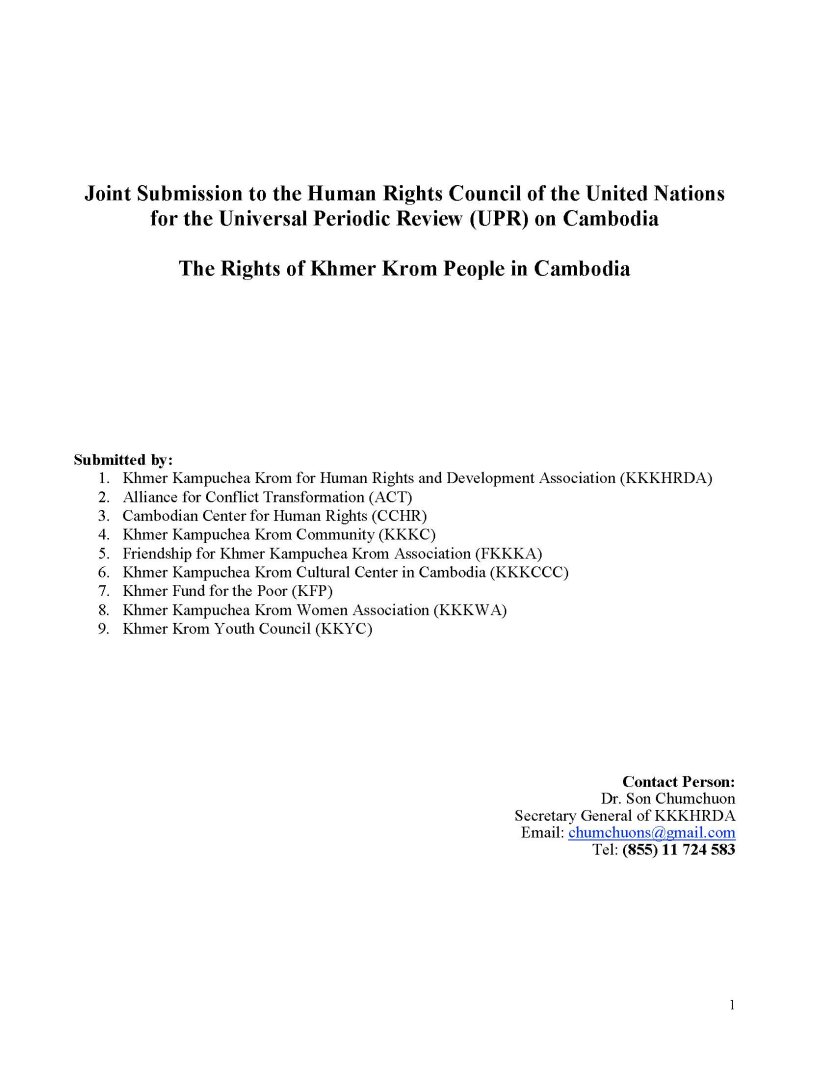
អានបន្ត Joint Submission_4th UPR_Khmer Krom
Joint submission for the Fourth Universal Periodic Review on Cambodia prepared by Khmer Kampuchea Krom for Human Rights and Development Association (KKKHRDA), Cambodian Center for Human Rights (CCHR), Alliance for Conflict Transformation (ACT), and 6 other Khmer Krom human rights organizations based in Cambodia.
អានបន្ត -
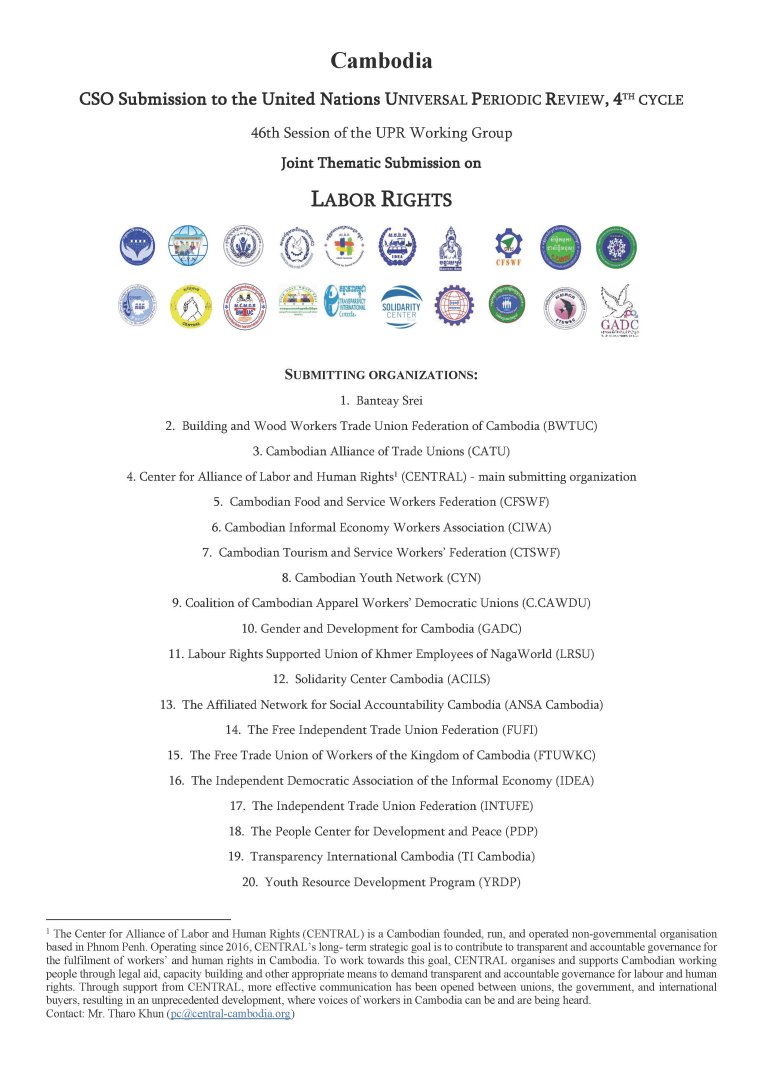
អានបន្ត Joint Submission_4th UPR_Labour
It is with concern that the members of this joint submission highlight the continued erosion of rights in the labor sector. We observe that the independent trade union movement in Cambodia is being specifically and systematically targeted via administrative requirements, judicial obstruction and harassment and criminalization. While the Royal Government of Cambodia seeks to project an image of reform by introducing amendments to the labor and trade union laws1, these changes are tokenistic concessions, for they do little to address the core issues with these laws nor align them with international standards.
អានបន្ត -
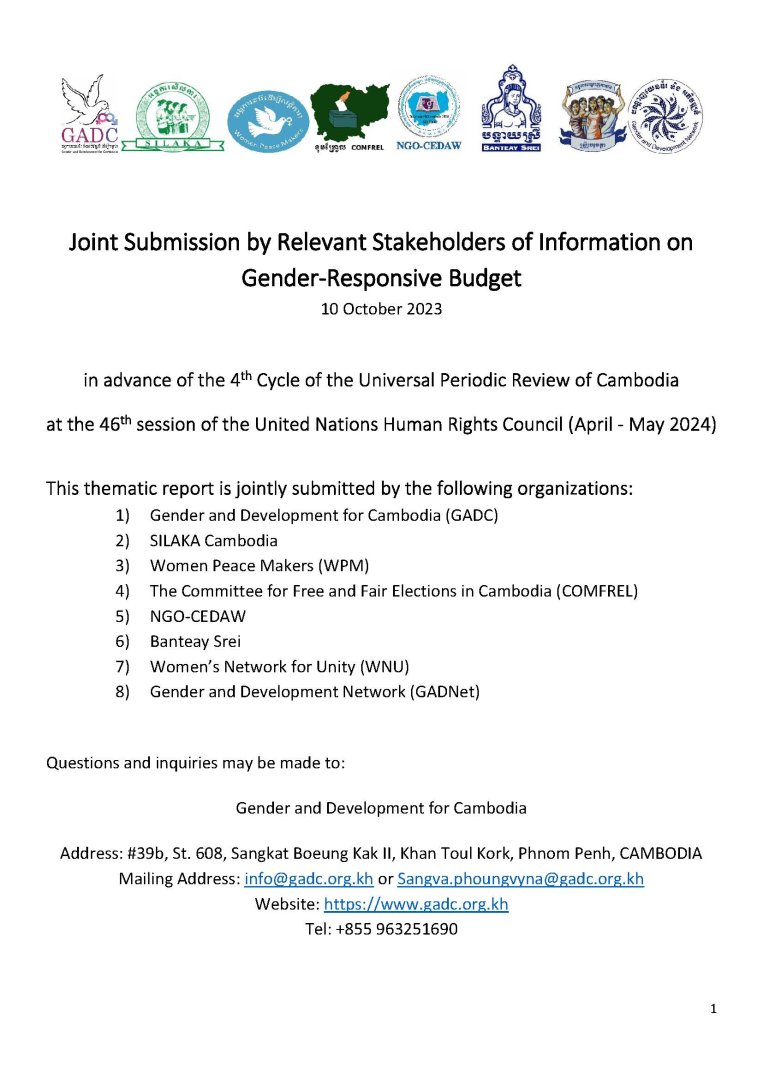
អានបន្ត Joint Submission_4th UPR_Gender Responsive Budget
While Cambodia has made repeated general commitments to gender equality, including ratifying the Convention on the Elimination of all Forms of Discrimination against Women (CEDAW) and referencing it in the Constitution, few practical steps have been taken in the law to dispel the negative gender stereotypes that persist throughout Cambodian society. While Cambodia does have a Ministry devoted to Women’s Affairs, that institution has the second lowest allocation of funds from the national budget of any ministry and is the only Ministry with a significant number of women in leadership roles.
អានបន្ត -
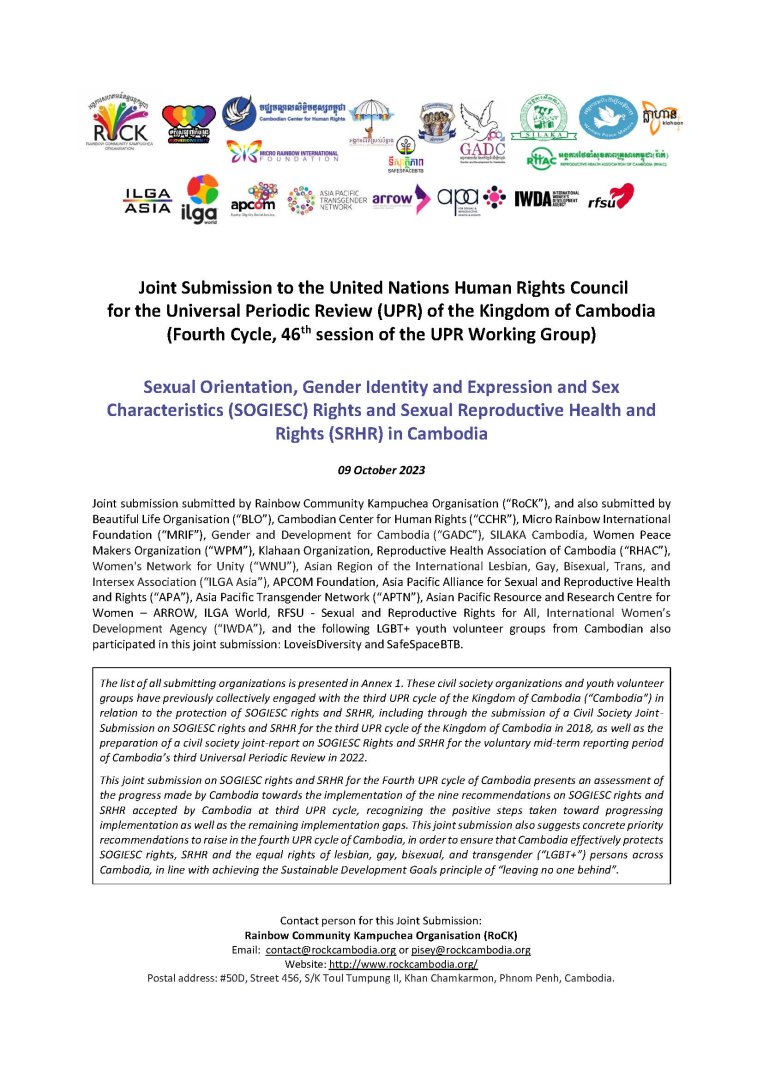
អានបន្ត Joint Submission_4th UPR_SOGIESC-SRHR
This civil society joint submission to the fourth Universal Periodic Review (“UPR”) cycle of the Kingdom of Cambodia (“Cambodia”) focuses on Sexual Orientation, Gender Identity and Expression and Sex Characteristics (“SOGIESC”) rights and Sexual and Reproductive Health and Rights (“SRHR”). The joint submission examines the progress made towards implementation of the nine recommendations on SOGIESC rights and SRHR accepted by Cambodia during the third UPR cycle in 2019, and suggests priority recommendations to be raised during the fourth UPR cycle of Cambodia.
អានបន្ត -
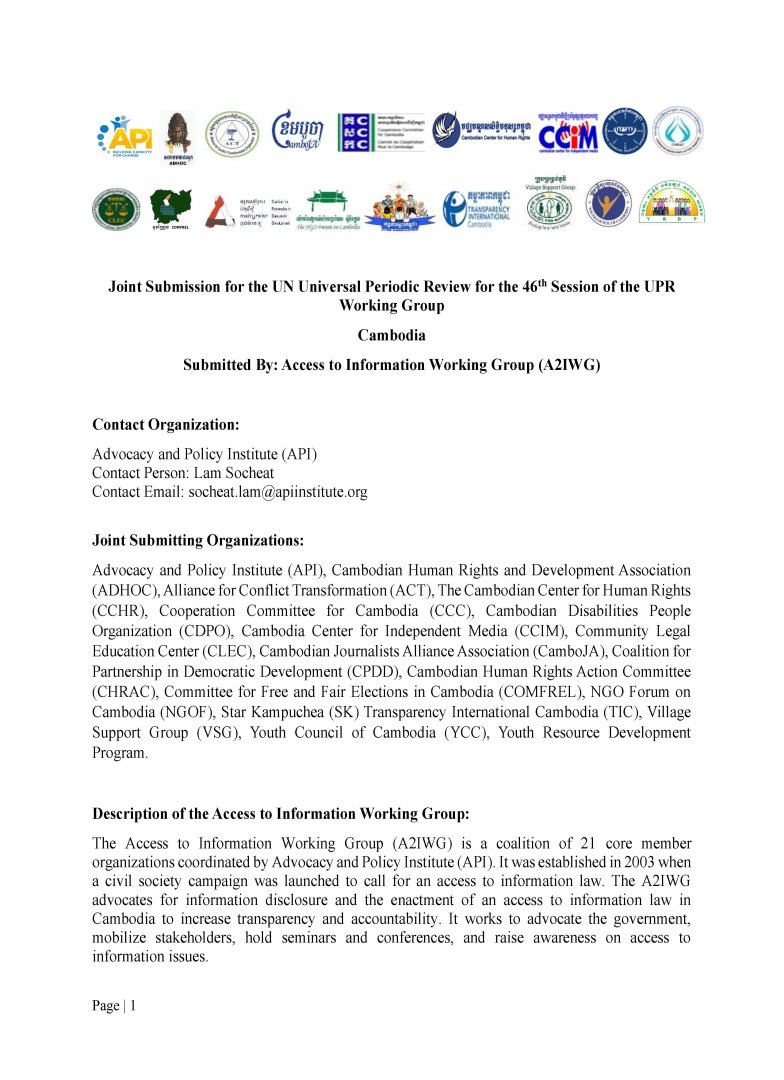
អានបន្ត Joint Submission_4th UPR_Access to Information
The Access to Information Working Group (A2IWG) is a coalition of 21 core member organizations coordinated by Advocacy and Policy Institute (API). It was established in 2003 when a civil society campaign was launched to call for an access to information law. The A2IWG advocates for information disclosure and the enactment of an access to information law in Cambodia to increase transparency and accountability. It works to advocate the government, mobilize stakeholders, hold seminars and conferences, and raise awareness on access to information issues.
អានបន្ត




